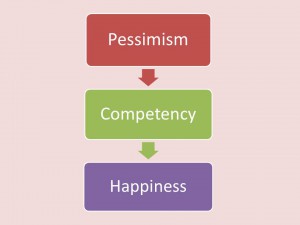Paradoxically, pessimism leads to happiness
 Can pessimism lead to happiness? Conventional wisdom says no:
Can pessimism lead to happiness? Conventional wisdom says no:
“Research shows that an optimistic outlook is good for your mental health,” said Patricia Spataro, director of the New York State Lawyer Assistance Program, a resource for attorneys with mental health concerns. “But lawyers are trained to always look for the worst-case scenario. They benefit more from being pessimistic, and that takes a toll.”
-Patricia Spataro, director of New York State Lawyer Assistance Program, as quoted in the New York Times
This doesn’t bode well for pessimism as a lawyer’s trait. You, our readers, know that pessimism (or synonymously, skepticism) negatively impacts law firm culture by discouraging teamwork and collegiality. Now pessimism is one of the culprits responsible for unhappiness too.
But a recent study sheds new light on the issue. The highest predictors of happiness are autonomy and competency, according to a recent study by Lawrence S. Krieger and Kennon M. Sheldon titled “What Makes Lawyers Happy?: A Data-Driven Prescription to Redefine Professional Success”. That is, the more autonomy and competency a lawyer has, the happier the lawyer will be.
This has deep implications. We discussed here how competent lawyers typically carry a set bundle of traits including a high level of pessimism, autonomy and urgency, and low levels of sociability and resilience. All of these traits help make a lawyer competent, and, therefore, happy.
Following the same logic, pessimism can also make lawyers happier. A pessimistic lawyer is better at analyzing arguments, searching out facts, and conducting discoveries and cross-examinations. The pessimistic eye leaves no stone unturned. Pessimism leads to competency. Competency leads to happiness. Which means, paradoxically, pessimism leads to happiness.
Happiness is a thousand-piece puzzle. Traits like pessimism can increase happiness in one way, such as by establishing competence, and at the same time decrease happiness by affecting one’s attitude toward life.
In the meantime, the study delivers a nice message. Lawyers take heart: do your job well, take control of your practice, treat others nicely, and happiness will follow.

Leave a Reply